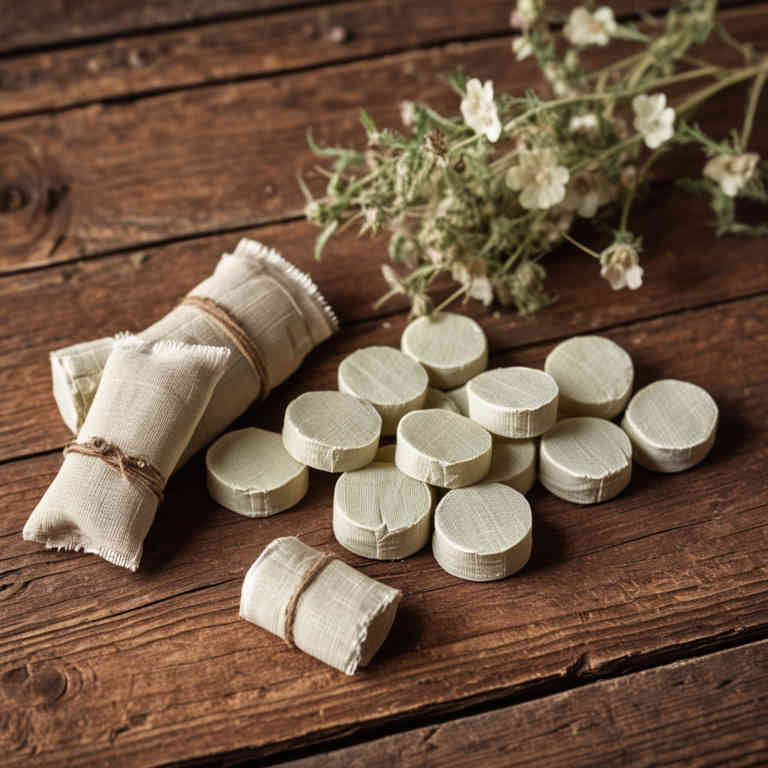Althaea officinalis lozenge for medicinal use

Althaea officinalis lozenge is a medicinal preparation made from the dried root of the marshmallow plant, known for its soothing properties.
It is commonly used in herbalism to alleviate symptoms of sore throats, coughs, and inflammation in the respiratory tract. The lozenge works by coating and protecting the mucous membranes, reducing irritation and promoting healing. It is often recommended for individuals suffering from colds or chronic respiratory conditions.
Its mild and gentle nature makes it suitable for use in children and adults alike.
Uses
Althaea officinalis lozenge has been used to soothe sore throats and alleviate symptoms of respiratory conditions for centuries.
Historically, it was valued in ancient Egypt and Greece for its healing properties, often used to treat coughs and inflammation. Traditional medicine systems, including Chinese and Ayurvedic practices, have also incorporated it for its mucilage content, which forms a protective layer over irritated tissues. In modern times, it is still widely used as a natural remedy for throat irritation, coughs, and minor respiratory discomfort.
Its continued popularity reflects its effectiveness and safety profile, making it a trusted herbal preparation in both traditional and contemporary health practices.
Benefits
Althaea officinalis lozenge has health benefits such as soothing sore throats, reducing inflammation, and alleviating symptoms of respiratory conditions.
It contains mucilage, which forms a protective layer over irritated tissues in the throat and respiratory tract. This herbal preparation is often used to relieve coughing and hoarseness due to its demulcent properties. It may also support immune function and ease discomfort associated with colds or allergies.
Althaea officinalis lozenge is a natural remedy that can be safely used as part of a holistic approach to throat and respiratory health.
Constituents
Althaea officinalis lozenge active constituents include mucilage, polysaccharides, alkaloids, and flavonoids.
Mucilage and polysaccharides are the primary components responsible for the lozenge's soothing and demulcent properties. These compounds form a protective layer over irritated mucous membranes in the throat, providing relief from soreness and inflammation. Alkaloids may contribute to mild antimicrobial activity, while flavonoids offer antioxidant benefits.
Together, these constituents support respiratory health and alleviate symptoms of coughing and throat discomfort.
Preparation
To make Althaea officinalis lozenge, start by preparing a mucilage from the root of the plant by soaking it in cold water for 24 hours.
Strain the mixture to remove the solid residue, then combine the mucilage with a sugar syrup made by dissolving sugar in water over heat. Once the mixture has cooled slightly, add a small amount of glycerin to help preserve the lozenges. Pour the mixture into molds and allow it to harden at room temperature or in a refrigerator.
These lozenges can be used to soothe sore throats and coughs due to their demulcent properties.
Side Effects
Althaea officinalis lozenge may lead to mild gastrointestinal discomfort, such as nausea or stomach upset, particularly when taken in large quantities.
It is generally considered safe for short-term use, but prolonged consumption may cause constipation or diarrhea in some individuals. The lozenge's mucilage content can thicken the throat secretions, which might be problematic for people with chronic respiratory conditions. Allergic reactions, including skin rashes or itching, are possible in individuals sensitive to the plant's components.
As with any herbal preparation, it is advisable to consult a healthcare professional before use, especially for those with pre-existing medical conditions or taking other medications.